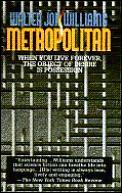
| Series: | Metropolitan #1 |
| Publisher: | HarperPrism |
| Copyright: | 1995 |
| Printing: | April 1996 |
| ISBN: | 0-06-105441-0 |
| Format: | Mass market |
| Pages: | 359 |
In About Writing, Samuel Delany states that one of the characteristics of the novel is a change or interaction between social classes. A protagonist changes classes, has to learn to survive in a different class, encounters a conflict between classes, or otherwise moves through the structure of society, bringing the reader with them. It's an intriguing claim, and since reading that passage I've noticed it, sometimes subtly, sometimes not, in many novels. But none brought that comment more immediately to mind than this book.
Metropolitan is set in the distant future, in a world where the City spans essentially the entire land mass of the globe. It appears to be a post-Singularity world of some type: in the mythology of the inhabitants, there are immortals and gods who dwell in the heavens and who have enclosed the world in an impregnable Shield that hides the sun and stars and traps the inhabitants on the planet. So far, all is explainable through science fiction, but the defining twist is an intriguing take on feng shui. In the world of Metropolitan, physical structures produce energy known as plasm, and on plasm fortunes are made and governments rise and fall.
Plasm functions essentially as magical power. One who is trained in its manipulation (or has a natural affinity) and has access to enough of it can shape the world as they see fit. However, Williams takes a step beyond the usual drama of power: this is a modern, industrial, governed world, and plasm is tapped, metered, restricted, and controlled by endless bureaucracies who route it to those who pay for it. The power may be magic, but the structure is pure modern capitalism, complete with tiered classes based on their access to plasm and prodiguous use of plasm for such prosaic and annoying activities as skywritten advertisements while the poor can afford essentially none.
The protagonist, Aiah, works for the Plasm Authority in her district, indirectly sending plasm as contracted to different buildings and occasionally investigating plasm anomalies. She's of a different race than the ruling class of the district, causing her to be treated with occasional, hidden semi-racism that again echos modern capitalism more than either future idealism or typical fantasy. She comes from a poor, close-knit family group that isn't idealized. Her mother starts scenes and sometimes actively endangers her, caring about her family but caring about getting attention and being at the center of drama even more. She wants to get away from her past, work her way up the social food chain, but she also strongly identifies with her people's mythology as the Cunning People, tricking those in power out of their money and resources. She believes in the Metropolitan Constantine and his vision of the New City, a dynamic idealism of overthrowing entrenched power, despite the catastrophic end of his attempt to put this vision into effect. His people were destroyed (as Aiah's were conquered) and he now lives in her district in exile (still extremely rich). She is, in short, caught uncomfortably between a family atmosphere that she'd rather escape, a tradition that she both respects and is uncomfortable with, daydreams of a better political world, and advancement in a structure she doesn't really believe in and which doesn't really believe in her.
When she stumbles across an unknown, vast store of plasm, all these conflicting impulses come to a head. She's able to explore her natural talent for plasm manipulation, which she could never afford before, but she doesn't know what to do with her find. Acting half on idealism, she approaches Constantine to sell him the source, attempting to stay cynical and manipulative but underneath wanting to believe in his vision. She's drawn into his world of high-stake power games among the rulers of the city, the ones with access to nearly unlimited plasm, and becomes an untrusted insider herself. This is not a book where that sort of change is easy or comes without violence to social relationships or one's sense of self. Williams tries to tackle hard questions about class mobility, self-image, and social context, and does so with clear (if not always inspiring) characters and no simple villains.
He doesn't always succeed, mind. Aiah still has a rather easy time of it (natural plasm talent and a suspiciously easy time at getting in touch with Constantine, for instance, although Williams does attempt to explain the latter), and the ending was a bit easy (if the temples have that much plasm, I would have thought they'd show up earlier in the city politics). I also got a touch annoyed at trying to keep straight the names of city regions and races; it adds a sense of history, but can also be confusing. But despite a few missteps and a rather simple plot, I admire what Williams attempted here. This setting of balanced bureaucracy and human politics, neither utopian nor fully dystopian but still larger than the characters, is too rare in SF and a nice change of pace. Metropolitan only rarely grabbed me, but it was consistently interesting and entertaining enough that I'll look for the sequel.
Followed by City on Fire.
Reviewed: 2006-08-14